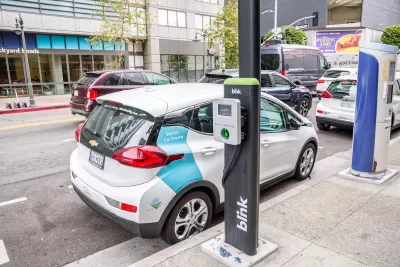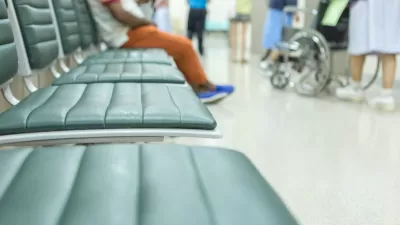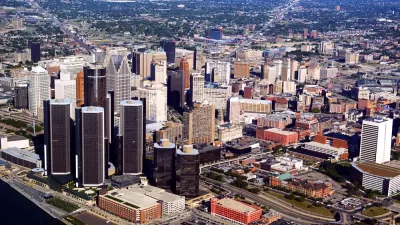Data from a Los Angeles car share program showed its impact on underserved communities was ‘limited by its small footprint.’

A new report assesses the potential of the BlueLA car share program to improve transportation equity in Los Angeles. As Gersh Kuntzman explains in Streetsblog USA, the report notes that low-income residents gain improved transportation access only when programs are heavily subsidized and have broad coverage areas.
“There's no question that car-share has shown potential in helping urban areas reduce automobile ownership and lower vehicle miles traveled, as well as increasing walking and public transit use. But other studies have shown that urban car-share members are disproportionately white, even when vehicles are located in neighborhoods with many disadvantaged residents.”
The BlueLA program aimed to provide service in underserved areas and offer low rates, but the study notes that “during the study period, BlueLA stations ‘only served a small portion of the city of Los Angeles,’ the report said, reducing transportation access for people who don't own cars, but would have liked to have used BlueLA.”
Kuntzman gives examples from other cities that are working to expand access to car share services. “The Philadelphia Housing Authority has just inked a deal — thanks to a federal Housing and Urban Development job program grant — that will bring two Zipcars to each of four housing projects,” and New York City is providing public housing residents with free Zipcar memberships. City officials hope car share can improve mobility and help residents avoid the burdens of car ownership.
FULL STORY: To Improve Equity, Car-Share Needs Subsidies, Large Coverage Area: Report

Planetizen Federal Action Tracker
A weekly monitor of how Trump’s orders and actions are impacting planners and planning in America.

Congressman Proposes Bill to Rename DC Metro “Trump Train”
The Make Autorail Great Again Act would withhold federal funding to the system until the Washington Metropolitan Area Transit Authority (WMATA), rebrands as the Washington Metropolitan Authority for Greater Access (WMAGA).

The Simple Legislative Tool Transforming Vacant Downtowns
In California, Michigan and Georgia, an easy win is bringing dollars — and delight — back to city centers.

Albuquerque’s Microtransit: A Planner’s Answer to Food Access Gaps
New microtransit vans in Albuquerque aim to close food access gaps by linking low-income areas to grocery stores, cutting travel times by 30 percent and offering planners a scalable model for equity-focused transit.

This City Will Pay You to Meet Your Neighbors
A North Kansas City grant program offers up to $400 for residents to throw neighborhood block parties.

Commentary: Our Silence Will Not Protect Us
Keeping our heads down and our language inoffensive is not the right response to the times we’re in. Solidarity and courage is.
Urban Design for Planners 1: Software Tools
This six-course series explores essential urban design concepts using open source software and equips planners with the tools they need to participate fully in the urban design process.
Planning for Universal Design
Learn the tools for implementing Universal Design in planning regulations.
Smith Gee Studio
City of Charlotte
City of Camden Redevelopment Agency
City of Astoria
Transportation Research & Education Center (TREC) at Portland State University
US High Speed Rail Association
City of Camden Redevelopment Agency
Municipality of Princeton (NJ)





























